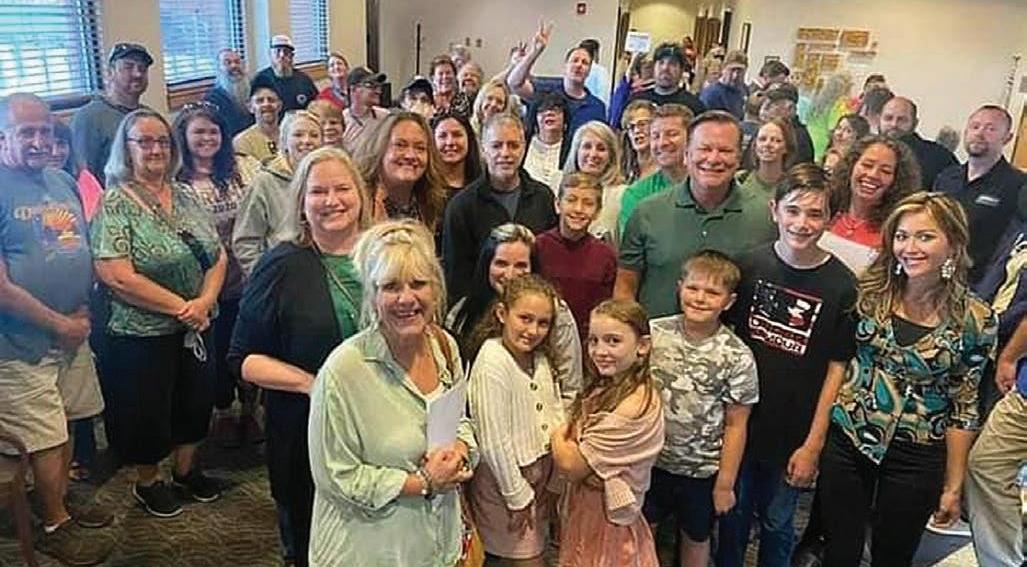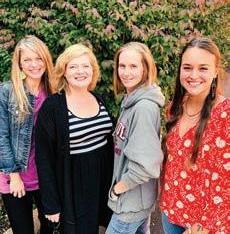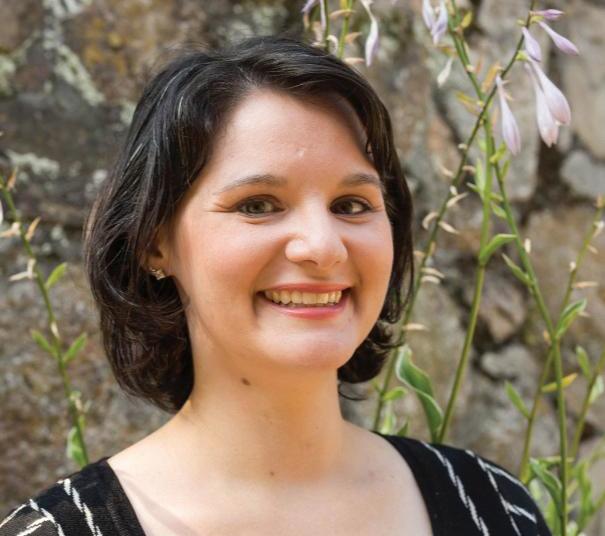
13 minute read
Newspaper story fuels tumultuous Waynesville meeting
Newspaper story fuels tumultuous Waynesville town meeting
Dozens of people flooded the Waynesville Board of Aldermen meeting last week to protest a mask mandate that wasn’t on the board’s agenda.
Donated photo
BY CORY VAILLANCOURT STAFF WRITER
Aroutine housekeeping measure intended to clarify who, exactly, can declare a State of Emergency on behalf of the Town of Waynesville — and, for what reasons — devolved into a disruptive shouting match over a non-existent “mask mandate.” Town officials, including Mayor Gary Caldwell, attribute all the fuss to a sensationalized story containing multiple inaccuracies.
The agenda published in advance of the Oct. 27 Town of Waynesville Board of Aldermen meeting contained, among other things, a mundane procedural item regarding emergency powers.
Ordinances regarding States of Emergency typically delineate who is authorized to declare such an emergency and reasons warranting such a declaration. Usually, they are natural or human-caused emergencies like ice storms, industrial accidents or civil unrest.
A State of Emergency grants local governments additional powers, including the ability to declare curfews, close alcohol and gun shops, and ban the sale of gasoline. They’re designed to keep people off the streets and out of harm’s way so first responders can tend to the emergency without distraction.
As it turns out, the town’s existing ordinance was based on a state law that had been repealed and replaced. Town Attorney Bill Cannon was put to work updating it.
“He had to rewrite our basic State of Emergency ordinance in conformance with a new law that the legislature passed after they repealed the old one,” said Waynesville Town Manager Rob Hites. “The new law states that the board of aldermen can delegate the power to declare an emergency to the mayor and in his absence, the mayor pro tem.”
The updated version also added “public health” to the list of emergencies that could warrant such a declaration.
On the agenda, the action associated with the revamped emergency ordinance was to authorize the mayor pro tem to declare such an emergency if the mayor is incapacitated or unreachable.
Attached to the ordinance, however, was a “sample” proclamation — Cannon’s vision of what a mask mandate might look like.
That item was referred to as a sample throughout the agenda packet. No action was associated with it, no public hearing was called for it and there was absolutely no indication on the agenda that any vote would be taken on it.
That’s why several of Waynesville’s elected officials took issue with a story published by The Mountaineer the day before the meeting, that stated, “Waynesville is expected to issue a state of emergency proclamation Tuesday evening mandating face coverings within the town limits, barring certain legally allowed exemptions.”
Mayor Gary Caldwell blasted the story as inaccurate.
“That statement would not be accurate,” said Caldwell. “Definitely not.”
Caldwell explained that the since the sample proclamation wasn’t listed as an action item on the agenda, and no public hearing was associated with the item, saying a mask mandate was “expected” was way off base. He also said that even if they’d decided to consider Cannon’s “sample proclamation,” there were too many defects — for example, how does it apply to schools, to churches and to private businesses?
“Before you can even pass a proclamation like that, you would have to have those answers to go with it,” Caldwell said.
Alderman Anthony Sutton echoed Caldwell in saying he did not find the statement in The Mountaineer to be accurate. Alderman Jon Feichter said he wouldn’t make any decision before a public hearing.
“I don’t know that there would have been an expectation that we would have passed that exact proclamation,” said Alderman Chuck Dickson. “I can say that I expected that we would talk about it. As far as the particular agenda item, it was actually not on the agenda. The only thing that was on the agenda was the emergency ordinance.”
Mayor Pro Tem Julia Freeman agreed that the sample proclamation was not actually on the agenda, although she understood why it could be perceived that way.
Another inaccuracy in The Mountaineer story, according to Sutton, was a statement saying: “Town board members are unanimously backing the local mask mandate although the order would technically be
SEE MEETING, PAGE 14


Cullowhee | MLS 3540189 | $579,000 Waynesville | MLS 3608641 | $700,000 Follow the tree-lined winding road along Move in Ready! Located in the the bold stream until you arrive at this Waynesville Country Club above private country farm. Golf course. 2 wooded acres offer privacy & quiet. Mountain views. Billy Case, CCIM (828) 508-4527 billycase@naibeverly-hanks.com
JustDoOils.com



Book online at: MassageWaynesville.com 828.456.3585 Haywood Square | 288 N. Haywood St. | Waynesville

· BY KRISTINA SMITH ·
Jan. 30, 2020 — My genetic test came back positive for BRCA2. A genetic mutation. The doctor explained how BRCA was the breast cancer gene and that they were tumorsuppressing proteins. Mine, however, were mutated, and may not do their job. He continued, calmly and slowly, with the next steps, the referrals he was making to oncology, geneticist, surgeons, and the list continued.
I could feel the leather of my black flats melting in with my feet as they became one with my body. I suddenly felt nude and vulnerable sitting in my doctor’s office. Suddenly, my millennial invincibility came crashing down as I sat with the doctor, alone in an exam room. My feet were cold and clammy. My heart was beating, but my breath stopped. The black hole that I had heard other people experience swallowed me like Jonah and the whale. The ocean of emotion was black and unforgiving.
This positive test meant I wasn’t just more susceptible to breast and ovarian cancer, but a slew of other cancers. I was a hostage in a situation where I was the captor and the victim. I had at least a 69 percent chance of breast cancer in my lifetime.
The doctor explained that I was a candidate for an oophorectomy, and once that was done, I would have some time before getting a prophylactic mastectomy. My family flashed into my fogged mind. My grandmother was diagnosed with ovarian cancer at 40 and died just about a year later from cruel cancer. Her grandmother (my great-great-grandmother) died of cancer. This was part of my family’s story. Now, was it my turn? However, I have choices that they didn’t have.
VISITING AN ONCOLOGIST DURING THE PRE-PANDEMIC
March 17, 2020 — As the world, specifically the U.S., was acknowledging that we were about to see a pandemic envelop our lives and strip away any sense of normalcy, I was sitting in an oncologist’s office getting my blood drawn.
The doctor’s discussion was a haze filled with recommendations, referrals, second opinion recommendations, and pandemic themes. The biggest takeaway — get an oophorectomy now. Remove my ovaries and fallopian tubes, which would ultimately fling me, at 36, during a pandemic, into menopause. Unlike my grandmother and great grandmother, I was in a position to be proactive, to take this course of action of preventative care.
I spent time in and out of radiology for a mammogram, follow-up ultrasounds, an MRI, surgical consults, and many blood tests. Once I was ready to schedule the surgery, we were in a pandemic phase where elective surgeries were restricted. This meant that I and countless other people who were needing life-saving preventative surgeries were delayed. The darkness of the delay mixed with remote work, distance learning for my kid, and the uncertainty of the world had me appreciating the small things around me.
Being able to stay home. Having food in the pantry. Having a job. Having a job that has benefits. This was a humbling time; my humanity was loose on my sleeve. A lesson filled with moments of mourning for my body and future, while also filled with the hope that preventative medicine can bring. People around the world were dying, and I was in a position to help myself, and it felt simultaneously empowering although filled with privilege.

SURGERY
I was wheeled out of surgery on the morning of June 29. It took about a month for hot flashes, insomnia, and fatigue to arrive post-op. While I’m opting out of hormones for now in favor of a lifestyle

change, I know there will come a time when that will be the course of action.
My prophylactic mastectomy is scheduled for early 2021. That decision was also mine. It’s preventative, while also, again, empowering and filled with privilege. I hope one day I have the honor of sharing my mastectomy story with someone that needs to hear they aren’t alone, and that they are, more importantly, enough.
These surgeries don’t define my femininity or the love I have for myself. Rather they are the truest example of the love I have for myself and the hope I have for the future.
Kristina Smith lives in Canton with her husband and son. She is a Canton Alderwoman and works at Biltmore Estates.
Editor’s note: For the complete version of this article, visit www.smokymountainnews.com/rumble/item/30110-mystory-as-a-previvor-a-brca2-diagnosis
The Team

Digital Media Specialist Susanna Shetley (from left), SMN News Editor Jessi Stone, Graphic Designer Jessica Murray, Staff Writer Hannah McLeod and Amanda Singletary (not pictured)
Rumble is a weekly e-newsletter created by women, for women and about women. It is published by The Smoky Mountain News and delivered to your inbox each Thursday. The goal is to offer readers a beautifully curated email that will inspire and motivate women to live their best lives. By hearing the challenges and successes of other women, we hope you will find an opportunity to live, love, learn and grow in your own unique way.
mountain s uthmedia
Subscribe: smokymountainnews.com/rumble

FREE ESTIMATES


HaywoodBuilders.com 100 Charles St. WAYNESVILLE
put some fun in your kitchen

MEETING, CONTINUED FROM 12 signed into law by Mayor Gary Caldwell as a state of emergency proclamation.”
Sutton said he never told The Mountaineer reporter he would support any such proclamation.
“I don’t comment on how I will vote before anything comes before the board, because you generally don’t know how the other board members are going to react, or after listening to public comment how you would react,” he said. “So, I try to go into things without prejudging the outcome.”
Yet another problem noted by Sutton and Caldwell was that throughout the news story the “sample” proclamation is repeatedly referred to as a “proposed” proclamation. The agenda for the meeting does not show any “proposed” action for the sample proclamation, other than review. No proposed vote. No proposed public hearing.
“I try not to judge people’s intentions, so I’m trying to give people the benefit of the doubt, but as far as I can say, that was an inaccurate statement,” Sutton said. “It was my assumption that it was a sample [proclamation].”
Moreover, another inaccurate statement in The Mountaineer story says the sample proclamation that wasn’t even up for a vote or a public hearing would “presumably include backyard cookouts with extended family members or even a conversation among neighbors at the mailbox if social distancing isn’t being adhered to.”
“That was definitely ridiculous, yeah,” Caldwell said. “That’s more proof that there’s just no way that you could have passed a proclamation with that language in it.”
Sutton said The Mountaineer’s presumption was “inaccurate as to what the sample proclamation stated.”
Dickson also took issue with the presumption.
“I don’t think we would ever consider trying to ban what somebody does in their own home, or in their backyard. One of the reasons we wouldn’t ban something like that is because that’s completely unenforceable and that’s not the intent of this ordinance,” he said. “I mean that the intent is not to be arresting people or making everything illegal. The purpose is to get people to be safe.”
Feichter agreed that the claim was sensational.
“I do. In considering whether or not the town of Waynesville should require mask usage in town, my thoughts never, ever extended to the possibility of people being required to wear masks on their private property or, when they went to their mailbox,” he said. “My only concern was in publicly accessible spaces like the grocery store or the Walmart or whatever. I never have or will have any interest in telling a somebody what they can or cannot do on their private property.”
The statements in The Mountaineer’s story turned what should have been a dull meeting with a number of non-controversial items on the agenda — like the revamped emergency ordinance — into a virtual free-for-all and a rallying point for antimaskers.
Dozens of people showed up for the meeting and ignored requests by town officials and police officers to wear masks. They also refused to leave once they exceeded Gov. Roy Cooper’s mass gathering limit of 25 people, as well as the fire code capacity of the building.
Shouting and chanting — including calling town officials “Nazis” — ensued. One woman even attempted to assault Assistant Town Manager Jesse Fowler.
“The best I can remember, what she said was, ‘The virus isn’t real, see, look, I’m gonna hug you,’ and she hugged me,” Fowler said. “Then she said, ‘I’m gonna kiss you,’ and grabbed my shoulders and started shaking my shoulders.”
The crowd at the meeting became so disruptive that Feichter made a motion to table the emergency ordinance revamp altogether.
Caldwell lays the blame for the fiasco on the story.
— Waynesville Alderman Jon Feichter
“The Mountaineer blew this out of proportion from what it was going to be,” he said. “There was no action that would be taken that night.”
He even called out the reporter at the meeting.
“I can’t remember the way I put it. I didn’t come out with the words ‘fake news,’ but I did put it out that ‘You do know the reason why they lie to promote what is going on here tonight, because this is what helps sell newspapers,’” Caldwell said. “Bad news is what they want. They do not want any kind of good news. They only want bad news, and I said, ‘This is what they’re trying to promote to sell the newspaper.”
As of press time, the agenda for the town’s next meeting, scheduled for Nov. 10, has not yet been published.
Although North Carolina is the nation’s ninth most populous state, it ranks seventh in terms of coronavirus cases. On Oct. 29, the state logged its highest-ever number of reported cases, with 2,855. The state’s second-biggest total occurred the next day, and the state’s third-biggest total occurred the day after that.
State and local guidance continues to hold that wearing a mask is the most effective and practical way to avoid passing the coronavirus from person to person.










